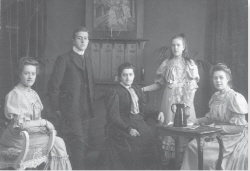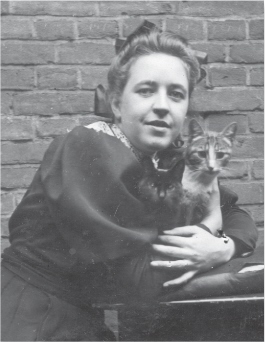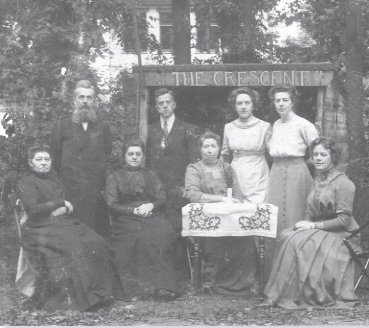The Hiding Place (6 page)

Best of all was when there were concerts at the cathedral, because a relative was sexton there. Just inside his small private entrance a wooden bench ran along the wall. Here we sat, our backs chilled by the ancient stone, our ears and hearts warmed by the music.

Cornelia ten Boom surrounded by her children in 1900: Nollie, Willem, Corrie, and Betsie.
The great golden organ was one that Mozart had played, and some of its notes seemed to come from heaven itself. Indeed, I was sure that heaven was like St. Bavo's, and probably about the same size. Hell, I knew, was a hot place, so heaven must be like this cold, dank, holy building, where smoke rose like incense from the footwarmers of the paying customers. In heaven, I fervently believed, everybody had footwarmers. Even in the summer the chill never left the marble grave slabs on the floor. But when the organist touched the keys, we scarcely noticedâand when he played Bach, not at all.
I
WAS FOLLOWING
Mama and Nollie up a dark, straight flight of stairs where cobwebs clutched at our hair and mice scuttled away ahead of us. The building was less than a block from the Beje, and probably a century newer, but there was no Tante Anna to wax and scrub.
We were going to see one of the many poor families in the neighborhood whom Mama had adopted. It never occurred to any of us children that we ourselves were poor; “the poor” were people you took baskets to. Mama was always cooking up nourishing broths and porridges for forgotten old men and pale young mothersâon days, that is, when she herself was strong enough to stand at the stove.
The night before, a baby had died, and with a basket of her own fresh bread Mama was making the prescribed call on the family. She toiled painfully up the railless stairs, stopping often for breath. At the top a door opened into a single room that was obviously cooking, eating, and sleeping quarters all at once. There were already many visitors, most of them standing for lack of chairs. Mama went at once to the young mother, but I stood frozen on the threshold. Just to the right of the door, so still in the homemade crib, was the baby.
It was strange that a society which hid the facts of sex from children made no effort to shield them from death. I stood staring at the tiny unmoving form with my heart thudding strangely against my ribs. Nollie, always braver than I, stretched out her hand and touched the ivory-white cheek. I longed to do it too, but hung back, afraid. For a while curiosity and terror struggled in me. At last I put one finger on the small curled hand.
It was cold.
Cold as we walked back to the Beje, cold as I washed for supper, cold even in the snug gas-lit dining room. Between me and each familiar face around the table crept those small icy fingers. For all Tante Jans's talk about it, death had been only a word. Now I knew that it could really happenâif to the baby, then to Mama, to Father, to Betsie!
Still shivering with that cold, I followed Nollie up to our room and crept into bed beside her. At last we heard Father's footsteps winding up the stairs. It was the best moment in every day, when he came up to tuck us in. We never fell asleep until he had arranged the blankets in his special way and laid his hand for a moment on each head. Then we tried not to move even a toe.
But that night as he stepped through the door, I burst into tears. “I need you!” I sobbed. “You can't die! You can't!”
Beside me on the bed Nollie sat up. “We went to see Mrs. Hoog,” she explained. “Corrie didn't eat her supper or anything.”
Father sat down on the edge of the narrow bed. “Corrie,” he began gently, “when you and I go to Amsterdamâwhen do I give you your ticket?”
I sniffed a few times, considering this.
“Why, just before we get on the train.”
“Exactly. And our wise Father in heaven knows when we're going to need things, too. Don't run out ahead of Him, Corrie. When the time comes that some of us will have to die, you will look into your heart and find the strength you needâjust in time.”
I
first met Karel at one of the “occasions” for which Mama was famous. Afterward I never could remember whether it was a birthday, a wedding anniversary, a new babyâMama could make a party out of anything. Willem introduced him as a friend from Leiden and he shook hands with us one by one. I took that long strong hand, looked up into those deep brown eyes, and fell irretrievably in love.
As soon as everyone had coffee, I sat down just to gaze at him. He seemed quite unaware of me, but that was only natural. I was a child of fourteen, while he and Willem were already university men, sprouting straggly beards and breathing out cigar smoke with their conversation.
It was enough, I felt, to be in the same room with Karel. As for being unnoticed, I was thoroughly used to that. Nollie was the one boys noticed, though like so many pretty girls, she seemed not to care. When a boy asked for a lock of her hairâthe standard method in those days of declaring passionâshe would pull a few strands from the ancient gray carpet in our bedroom, tie them with a sentimental blue ribbon, and make me the messenger. The carpet was quite threadbare by now, the school full of broken hearts. We sat on the edge of Willem's bed gulping down the precious bun; I suspected that to buy it Willem had had to go without lunch.
I, on the other hand, fell in love with each boy in my class in turn, in a kind of hopeless, regular rhythm. But since I was not pretty, and far too bashful to express my feelings, a whole generation of boys was growing up unaware of the girl in seat 32.
Karel, though, I thought as I watched him spooning sugar into his cup, was different. I was going to love Karel forever.
It was two years before I saw Karel again. That was the winter, 1908, that Nollie and I made a trip to the university at Leiden to pay Willem a visit. Willem's sparsely furnished room was on the fourth floor of a private home. He gathered both Nollie and me into a bearhug and then ran to the window.
“Here,” he said, taking in from the sill a cream bun he had been keeping cold there. “I bought this for you. You'd better eat it quick before my starving friends arrive.”
We sat on the edge of Willem's bed gulping down the precious
bun; I suspected that to buy it Willem had had to go without lunch. A second later the door slammed open and in burst four of his friendsâtall, deep-voiced young men in coats with twice-turned collars and threadbare cuffs. Among them was Karel.
I swallowed the last bit of cream bun, wiped my hands on the back of my skirt, and stood up. Willem introduced Nollie and me around. But when he came to Karel, Karel interrupted.
“We know each other already.” He bowed ever so slightly. “Do you remember? We met at a party at your home.” I glanced from Karel to Nollieâbut no, he was looking straight at me. My heart poured out a rapturous reply, but my mouth was still filled with the sticky remains of bun and it never reached my lips. Soon the young men were seated at our feet on the floor, all talking eagerly and at once.
Perched beside me on the bed, Nollie joined in as naturally as though visiting a university was an everyday event for us. For one thing, she looked the part: at eighteen she was already in long skirts, while I was acutely conscious of the six inches of thick black school-girl stockings between the hem of my dress and the top of my shoes.

Corrie with her cats.
Also, Nollie had things to talk about: the year before she had started Normal School. She didn't really want to be a teacher, but in those days universities did not offer scholarships to girls and Normal Schools were inexpensive. And so she chattered easily and knowledgeably about things of interest to studentsâthis new theory of relativity by a man called Einstein, and whether Admiral Peary would really reach the North Pole.
“And you, Corrie. Will you go on to be a teacher, too?”
Sitting on the floor at my feet, Karel was smiling at me. I felt a blush rise beneath my high collar.
“Next year, I mean,” he persisted. “This is your final year in secondary school, isn't it?”
“Yes. I meanâno. I'll stay home with Mama and Tante Anna.”
It came out so short and flat. Why did I say so little when I wanted to say so very much?
T
HAT SPRING
I finished school and took over the work of the household. It had always been planned that I would do this, but now there was an added reason. Tante Bep had tuberculosis.
The disease was regarded as incurable: the only known treatment was rest at a sanatorium and that was only for the rich. And so for many months Tante Bep lay in her little closet of a room, coughing away her life.
To keep down the risk of infection, only Tante Anna went in or out. Around the clock she nursed her older sister, many nights getting no sleep at all, and so the cooking and washing and cleaning for the family fell to me. I loved the work, and except for Tante Bep would have been completely happy. But over everything lay the shadow: not only the illness, but her whole disgruntled and disappointed life.
Often I would catch a glimpse inside when I handed in a tray or Tante Anna passed one out. There were the few pathetic mementos of thirty years in other people's homes. Perfume bottlesâempty many yearsâbecause well-bred families always gave the governess perfume for Christmas. Some faded Daguerrotypes of children who by now must have children and grandchildren of their own. Then the door would shut. But I would linger in that narrow passage under the eaves, yearning to say something, to heal something. Wanting to love her better.
I spoke once about my feelings to Mama. She too was more and more often in bed. Always before when pain from the gallstones had got too bad, she'd had an operation. But a small stroke after the last one made further surgery impossible, and many days, making up a tray for Tante Bep, I carried one upstairs to Mama also.
This time when I brought in her lunch she was writing letters. When Mama wasn't supplying the neighborhood with caps and baby dresses from her flying needles, she was composing cheery messages for shut-ins all over Haarlem. The fact that she herself had been shut-in much of her life never seemed to occur to her. “Here's a poor man, Corrie,” she cried as I came in, “who's been cooped up in a single room for three years. Just think, shut away from the sky!”
I glanced out Mama's single window at the brick wall three feet away. “Mama,” I said as I set the tray on the bed and sat down beside it, “can't we do something for Tante Bep? I mean, isn't it sad that she has to spend her last days here where she hates it, instead of where she was so happy? The Wallers' or someplace?”
Mama laid down her pen and looked at me. “Corrie,” she said at last, “Bep has been just as happy here with usâno more and no lessâthan she was anywhere else.”
I stared at her, not understanding.
“Do you know when she started praising the Wallers so highly?” Mama went on. “The day she left them. As long as she was there, she had nothing but complaints. The Wallers couldn't compare with the van Hooks where she'd been before. But at the van Hooks she'd actually been miserable. Happiness isn't something that depends on our surroundings, Corrie. It's something we make inside ourselves.”

